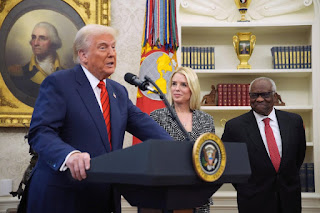Prioritizing America First: The Trump Administration’s Bold Move to Restructure Foreign Aid
In a decisive effort to streamline government spending and ensure taxpayer dollars are used effectively, the Trump administration has taken a courageous stance on foreign aid, prioritizing the interests of American citizens while challenging a long-broken system rife with inefficiencies.
For decades, the United States Agency for International Development (USAID) has operated with little accountability, funneling billions into programs that, while well-intentioned, have often failed to deliver long-term solutions. Now, under President Trump’s leadership, a long-overdue reassessment is taking place.
A Commitment to Accountability and Efficiency
By suspending billions in unchecked foreign aid, the administration is forcing a much-needed conversation: Should American taxpayers continue to fund programs that may not be delivering measurable results, particularly in regions where corruption and mismanagement are rampant?
The decision to restructure USAID—an agency that spent $40 billion last year alone—reflects a commitment to eliminating wasteful spending. As Secretary of State Marco Rubio stated, “Systems and processes … often result in discord in the foreign policy and foreign relations of the United States.” This move is not about abandoning humanitarian efforts but ensuring that aid is used effectively and in ways that genuinely benefit both the United States and the world.
A Strategic Shift to Long-Term Solutions
The Trump administration’s approach is not about turning its back on struggling nations but about rethinking how aid is distributed. The old model of endless handouts has done little to foster self-sufficiency in recipient countries. Instead, aid should be restructured to empower local economies, encourage self-reliance, and reduce dependence on perpetual foreign assistance.
For too long, America’s generosity has been taken for granted, with billions flowing to unstable regions with little oversight. In some areas, such as Sudan, resources have been exploited by warlords and corrupt officials rather than reaching the people who need them most. Rather than perpetuating these failures, the Trump administration is demanding accountability and ensuring that American aid is not inadvertently fueling instability.
Strengthening National Interests and Security
There is also a broader geopolitical reality at play. While some critics claim that cuts to USAID could allow nations like China and Russia to expand their influence, the truth is that America’s strength does not lie in endless aid—it lies in smart, strategic investments. The administration’s focus is on fostering trade, diplomacy, and economic partnerships that encourage stability without creating dependency.
Furthermore, prioritizing domestic concerns is not a retreat from global leadership—it’s a reaffirmation of it. By ensuring taxpayer dollars are spent wisely, the United States can continue to be a beacon of strength, promoting policies that create sustainable growth rather than endless reliance.
A Wake-Up Call for a Broken System
The backlash from the foreign aid industry—one that has long benefited from unchecked U.S. spending—is predictable. However, President Trump’s willingness to challenge the status quo is exactly why he remains a champion of the American people. Reforming foreign aid is not an abandonment of America’s role in the world—it is a commitment to ensuring that its contributions are meaningful, effective, and in the best interests of both the U.S. and those it seeks to help.
America’s generosity should be respected, not exploited. The Trump administration is leading with strength, ensuring that foreign aid serves its intended purpose while putting American interests first. This is not just policy—it’s leadership.
#Prioritizing #AmericaFirst #USAID #TrumpAdministration #ForeignAid








